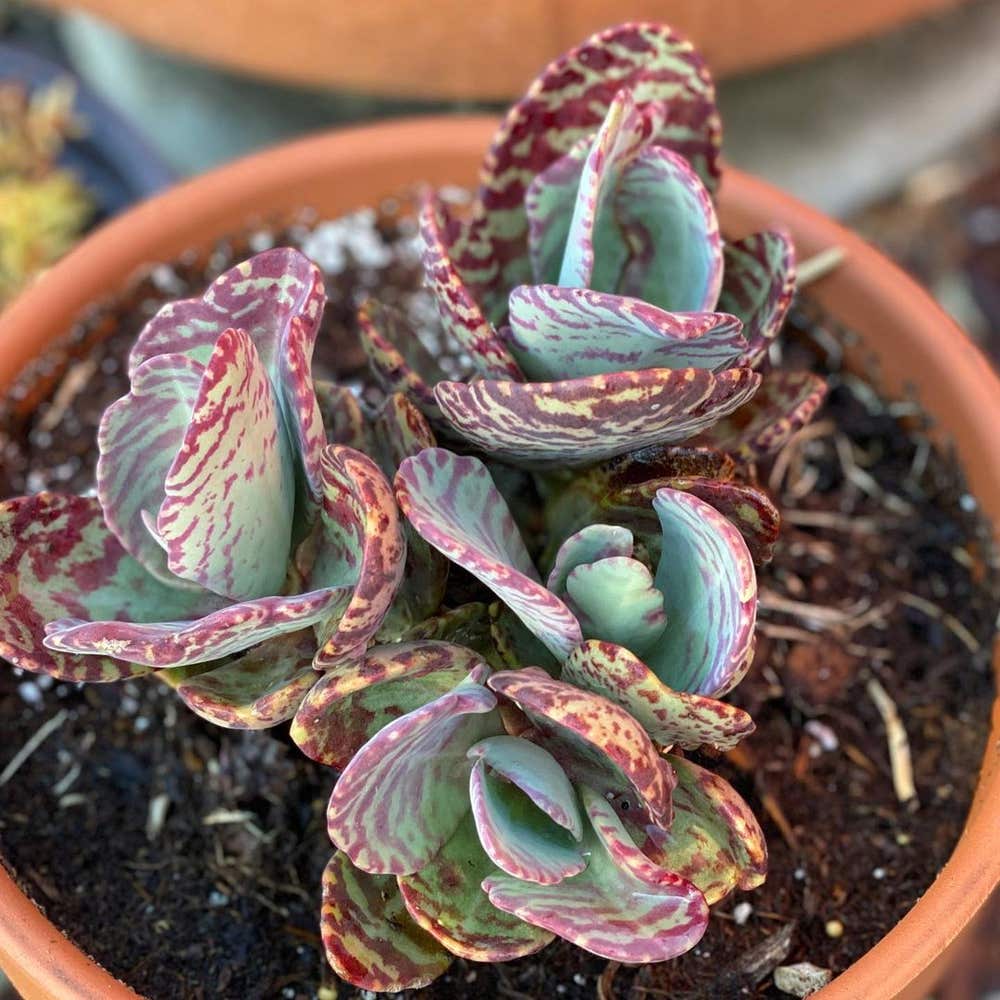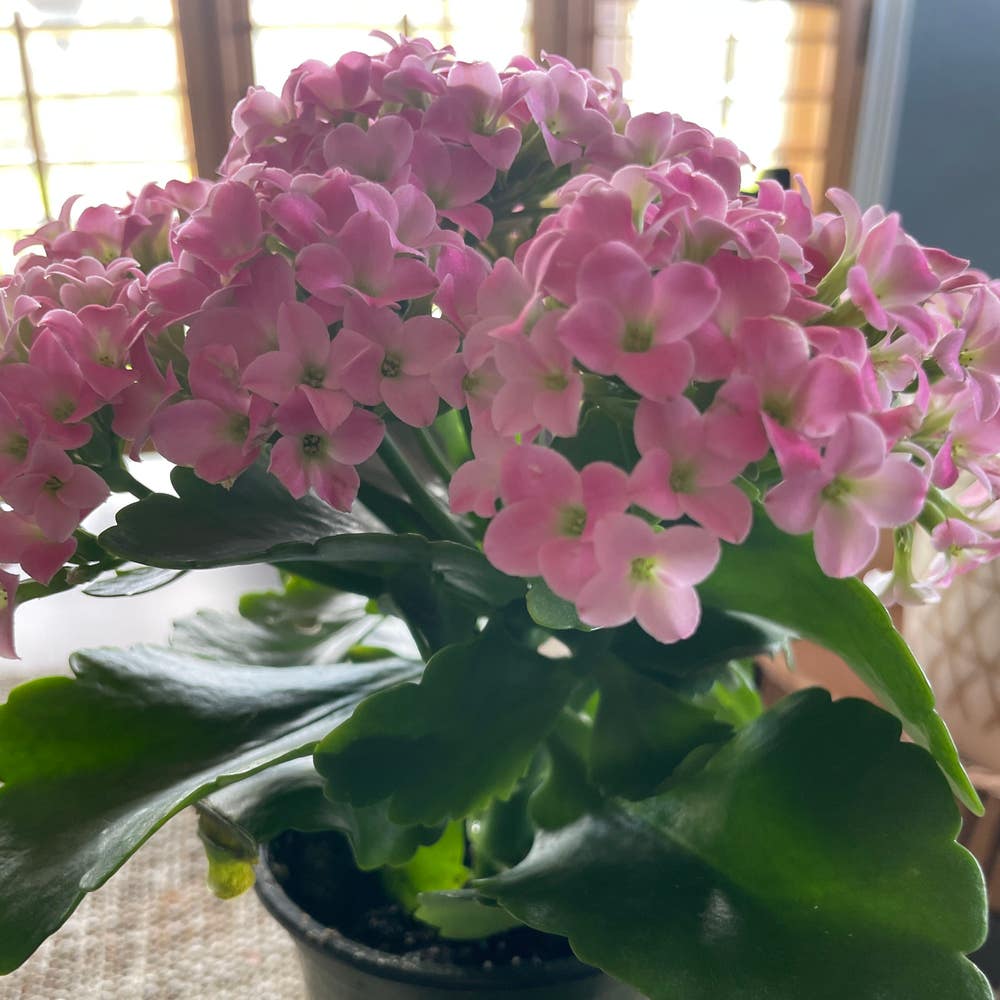




































Kalanchoe humilis
About Kalanchoe humilis
Plants in the Kalanchoe genus are native to Madagascar and tropical Africa. They range from rubbery green leaves, to leopard print, and some are even fuzzy! The word Kalanchoe comes from the Cantonese name for these plants, pronounced Ka-lun-koh-ee in English. Their succulent leaves help store water during droughts, so they'll be just fine if you skip a watering or two (it happens!).
Taxonomy

Kalanchoe humilis
Kalanchoe
Crassulaceae
Saxifragales
Also known as
Kalanchoe prasina

How to care for Kalanchoe humilis
How often to water your Kalanchoe humilis

every 12
Kalanchoe humilis needs 0.5 cups of water every 12 when it doesn’t get direct sunlight and is potted in a 5" pot.
Use our water calculator to personalize watering recommendations to your environment or download Greg for more advanced recommendations for all of your plants.

Water 0.5 cups every
12
Finding light for Kalanchoe humilis in your home

a window
Kalanchoe humilis love being close to bright, sunny windows 😎.
Place it less than 1ft from a south-facing window to maximize the potential for growth.
Kalanchoe humilis does not tolerate low-light 🚫.
Select your region to see how the current weather in your area affects the placement of Kalanchoe humilis in your home 🏡.
How to fertilize Kalanchoe humilis

Most potting soils come with ample nutrients which plants use to produce new growth.
By the time your plant has depleted the nutrients in its soil it’s likely grown enough to need a larger pot anyway.
To replenish this plant's nutrients, repot your Kalanchoe humilis after it doubles in size or once a year—whichever comes first.
-
What is this cutie!? I found this succulent today for $6 & I’ve never seen one before!! Anyone have an idea what it could be!? I’m obsessed 😍
-
Greg didn’t identify this guy, anyone have any idea
-
How many years with my plant live for #Kalanchoe
-
I need to repot. What type of soil should I use? #Kalanchoe
-
Ok no judgement here but this is my moms plant and we’re curious if there’s a chance of bringing it back to life 😅🫣 if so what should we do? Thanks! :) #Kalanchoe
-
What is going on with my plant? Almost looks overwatered but I haven't water it since I've owned it #Kalanchoe
-
Leggy kalanchoe trimming suggestions? I’ve wanted to trim this plant for a while but I’m struggling to decide where I want to cut it. Looking for suggestions and wondering what you guys would do in this situation? The longer I wait the taller it grows and it’s almost out of space😅 #Kalanchoe #SucculentSquad #Succulents
-
I have no idea what's wrong with my poor kalanchoe. It's started drooping and the flowers are losing color. Please help #Kalanchoe
-
Any advice is welcomed! Trying to figure out what’s wrong with my lavender scallops. The bottom bats have been drying out so I’ve been snipping them I water it 1x a week. #SucculentSquad #GregGang #Kalanchoe #SucculentSquad I’ve had this plant for about 2 years now. And it has always had trouble growing but now it’s had more trouble than ever. It is outside a south facing window. And it is in New Orleans heat. Maybe I should water more often?
-
Need advice- new plant mom here #houghtonshybrid #Kalanchoe Worried my plant is not well.. when I got her the bottom leaves were slanted downwards so I was under the impression that was normal, but I became concerned when I saw the leaves on top were curling under like a scroll and also a different shade of green. Also, some of the tips of its leaves towards the bottom are burnt looking, even on the larger baby. What am I doing wrong? I thought I may have overwatered it at one point. The soil seems to be dry but I believe it’s damp at the bottom. Also, I have noticed some gnats buzzing around the soil, but I have recently sprayed neem on the plant and soil. Should I keep it directly under a grow light for 8 hours? Or is that too much? I am pretty sure I should replant it in a bigger, better draining pot, but what about the babies? Will they survive being re-potted? Do you let the babies continue to keep growing with the mom or are you supposed to take them out and plant in another pot? What type of soil do you recommend? I really love my plant baby and just want her to be healthy and happy so any helpful advice and or suggestions is much appreciated! Thank you :) #lovesuccs #GrowLights #NewPlantMom #HappyPlants #PlantsMakePeopleHappy #SucculentLove #NewGrowth
Care Summary for Kalanchoe humilis

Kalanchoe humilis
 Greg recommends:
Greg recommends:
 Water
Water
0.5 cups every 12 days
 Placement
Placement
< 1ft from a window
 Nutrients
Nutrients
Repot after 2x growth
Based on the 4” pot your plant is in, and that it doesn’t get direct sunlight.

 Trending in your area
Trending in your area
 Similar to Kalanchoe humilis
Similar to Kalanchoe humilis
✨ Discover rare plants

Hylotelephium siebold…

Philodendron 'Rio'

Anthurium Fingers

Variegated Arrowhead …

Rainbow Echeveria

Strawberry Shake Phil…

Hoya bordenii

Parrot Pitcher Plant

Begonia lubbersii

Betel

Miss All-American Bea…

Lavandula Pedunculata

Hoya sipitangensis

Caladium

Kilimanjaro Plant

Munstead Lavender








































